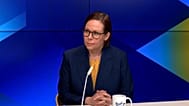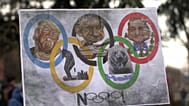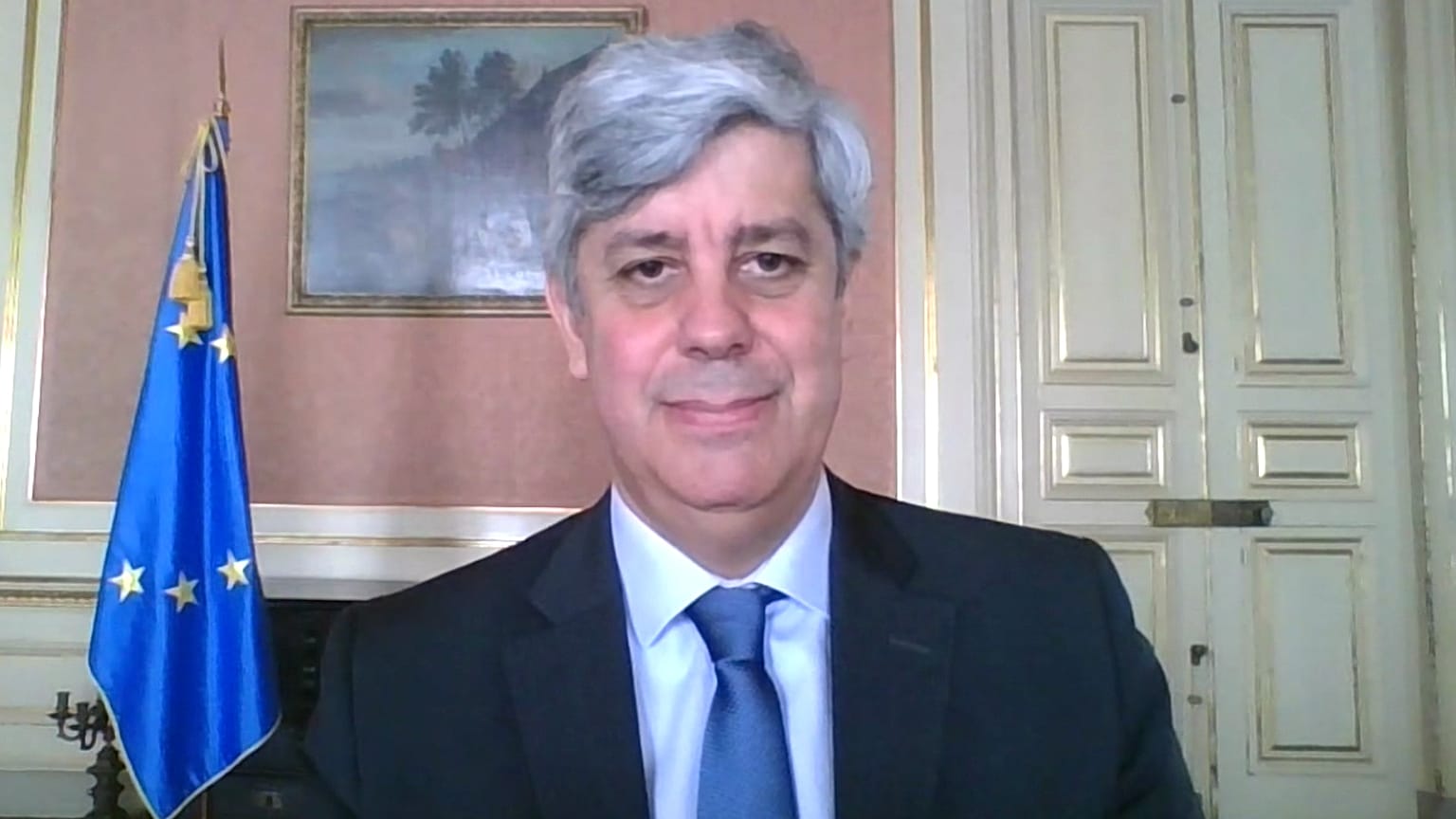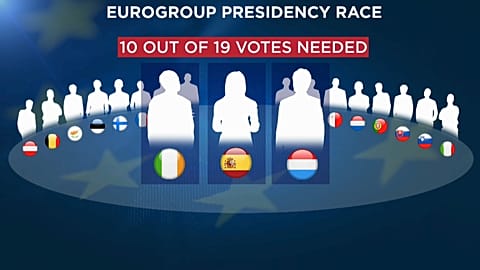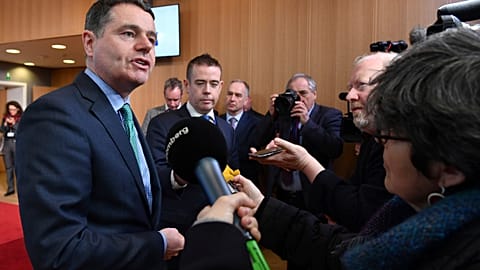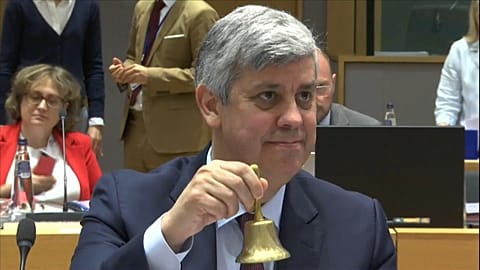Outgoing Eurogroup chief Mário Centeno speaks to Euronews about the EU's economic response to COVID-19.
Eurogroup President Mário Centeno speaks to Euronews' Isabel da Silva about the rescue measures he and other eurozone finance chiefs are taking to tackle the economic havoc caused by COVID-19. In addition to praising ongoing economic reform in countries like Greece, he suggests the coronavirus crisis has given the European Union an historic opportunity to bring about economic structural change, especially with regard to green and digital technologies.
"The end of a cycle"
Isabel da Silva, Euronews: "Thank you for joining us, Mr President. You resigned as finance minister of Portugal a few days ago, and you will not seek a second mandate as President of the Eurogroup, which will be elected early July. Why didn't you want to keep a role in fighting this crisis created by the pandemic?
 ADVERTISEMENT
ADVERTISEMENT
 ADVERTISEMENT
ADVERTISEMENT
Mário Centeno, President of the Eurogroup: "Well, you know, it's for no specific political reason. It's just the end of a cycle for me as President of the Eurogroup, as much as a finance minister of Portugal. I think we achieved a lot during the last two years and a half. [What] we were able to show in April this year proves that the group is well and very much focused on fighting the crisis. And so it was kind of a natural thing."
**Isabel da Silva, Euronews: "**But is it not also due to the fact that the eurozone reform is not advancing much, that the Eurogroup lacks some power to deliver more concrete results?"
**Mário Centeno, President of the Eurogroup: "**We achieved a lot on Greece, on the ESM (European Stability Mechanism) treaty reform. We also approved, last October, the embryo of eurozone budget that now is the basis for the resilience and recovery facility proposed by the [European] Commission. I think we indeed proved that the [Euro]group is very important for Europe and I am very happy and pleased with the results we achieved."
"Markets are reacting very, very well"
Isabel da Silva, Euronews: "The Eurogroup has approved three loan instruments, worth €540 billion, to deal with the COVID-19 impact, but they didn't generate much enthusiasm. Are there any member states resorting to these instruments?
Mário Centeno, President of the Eurogroup: "There is a backstop for firms with the EIB (European Investment Bank) and it is almost implemented. And I am pretty much sure that the 200 billion worth of guarantees of the EIB (European Investment Bank) will be used fully. There is one for workers, SURE, and actually, countries already informed the Commission of their intent to use these loans to finance programmes to support employment. And then the third one, which is the ESM. It's again, a backstop for sovereigns. What we have to evaluate at this stage is that markets are reacting very, very well to all the decisions that countries and the European Union are taking. There is plenty of liquidity, no difficulties in market access.
"A true European plan"
Isabel da Silva, Euronews: "But the European Central Bank (ECB) increased its programme to buy public debt by €600 billion. So you are very confident that the markets don't expect the turmoil coming from this part of the globe?
**Mário Centeno, President of the Eurogroup: "**The response of the ECB is part of our collective response. It's since the beginning of the crisis that ECB programmes add up to almost €1.5 trillion. It's a very strong response and it's one that is much needed to prevent fragmentation. That's why I've been telling everybody that Europe is back and Europe is back on the basis of a true European plan."
''Flexible and united"
Isabel da Silva, Euronews: "Regarding the recovery plan presented by European Commission, you said, and I quote, "There should be a focus on the quality of the expenditure". But there is a heated debate about the balance between grants and loans. In the end, what will be doable in terms of convincing member states, the famous frugal ones and the more expansionist ones?
Mário Centeno, President of the Eurogroup: "The negotiation is going to be tough. That's for sure. But there is a possible common ground for the bargaining to occur. It's gonna be a mixture of loans and grants for sure. That's the proposal of the Commission anyway. But we must be focused on two things. First: there is conditionality. This is not to finance past expenditure, current permanent transfers. This is to finance a structural change in Europe related with the green economy and digital. This is very important and we must stay focused on that. And the second idea is that there is no troika-like conditionality. So we are stronger because we are flexible and united.
Isabel da Silva, Euronews: "We are at the departure point, but how to make sure that the countries will stick to those conditions in their national programmes, in one or two years time, when political conditions might even change? There will be elections...
Mário Centeno, President of the Eurogroup: "I keep repeating, so people remember that we had the most coordinated ever fiscal stances across Europe in the pre-COVID moment. So, commitments were being applied. They were being followed. Risk reduction was a reality for already more than five years. The coordination of these recovery plans is a matter for the [European] Commission, but I also am pretty much confident that the Eurogroup will also continue to play a very important role on the economic policy coordination in the euro area."
"An historical possibility"
Isabel da Silva, Euronews: "Do you think that anytime soon, in a couple of years, they [member states] will accept to have common European taxes to repay the common debt?
Mário Centeno, President of the Eurogroup: "We now have an historical possibility to temporarily issue common debt by the European Commission, which will be, of course, paid in fully in a longer given maturity that is to be defined ... maybe 20 years, maybe 30 years. It makes all sense from an economic and political perspective to match this debt issuance with own resources. So we must work together to find these new sources of revenue for the Union as a whole. And there is one very interesting idea, which is to connect these resources precisely with the pillars of the recovery process, meaning digitalisation and the green economy. So if we connect those two parts of our story, it's much easier to make it understandable by European citizens."


